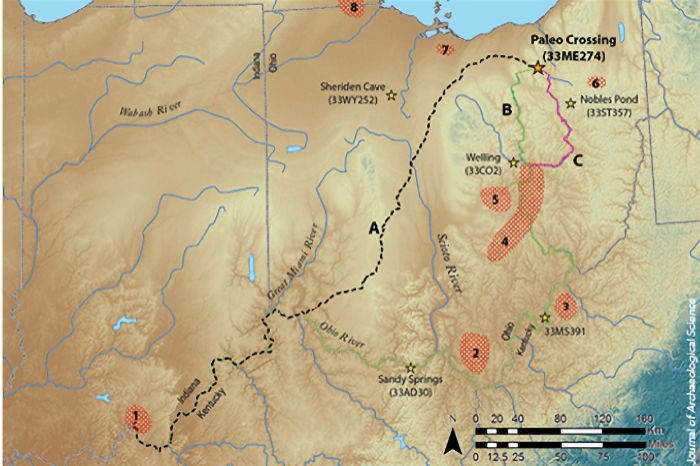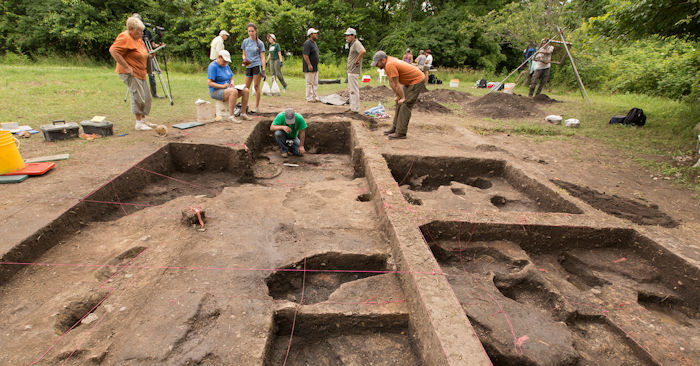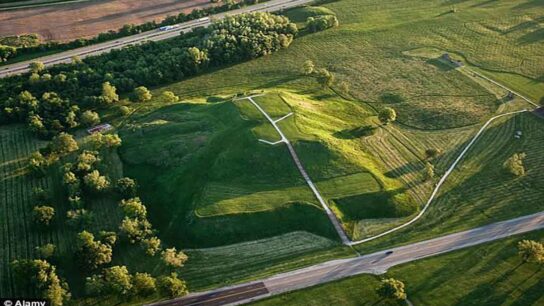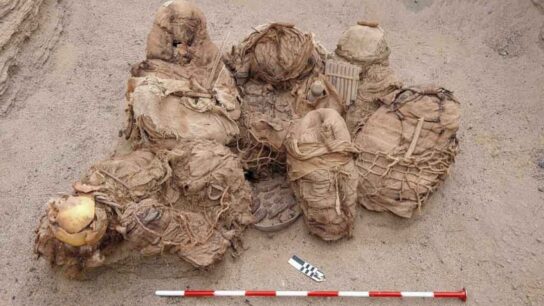Oldest House In Ohio A 12,250-Year-Old Clovis Dwelling? Archaeologists Re-Investigate The Paleo Crossing Site In North America
The oldest house in North America is located in Ohio. The 12,500-year-old dwelling was used by Paleoindians during the Ice Age.
Discovered in the early 1990s by David Brose who was with the Cleveland Museum of Natural History the house was examined and an interesting story suddenly emerged.
Newspapers reported “Archaeologists in Ohio have found what may be the oldest American home in a discovery described as being of staggering importance.
According to Cleveland Museum of Natural History officials, the Sharon Township site contained two pits littered with stone weapons and three holes for posts, dated more than 12,250 years old. The site was believed to be the living quarters of a group of prehistoric Paleoindian people.

The discovery matched the age of the Clovis people.
However, even at the time, not everyone was convinced the dwelling had been used by the Clovis people. “In 1995, an article in the Cleveland Plain Dealer’s Sunday magazine reported that some archaeologists had doubts about the post molds and the radiocarbon dates,” Brad Lepper, Senior Archaeologist for the Ohio History Connection’s World Heritage Program writes in an article published by the Columbus Dispatch.
In a recent study published in the Journal of Field Archaeology, Two teams, one from Kent State University, led by Metin Eren, and another from Southern Methodist University, led by David Meltzer, collaborated in a recent reinvestigation of the Paleo Crossing site. The researchers’ conclusion is that there is room for doubt.

A re-investigation of the documentation showed that Bros had only found one definitive post mold. The other two turned out to be a possible root stain and a mapping error.
According to Brad Lepper, ” Between 2016 and 2018, Eren and Meltzer excavated 32 square meters in the same area where Brose worked. They identified six possible post-molds similar to what Brose found. Disappointingly, radiocarbon dates showed they ranged in age from 300 to 1,100 years old.
At least some of these posts appear to be historic-era fence posts probably made from wood cut from old trees on the property, but even the oldest is more than 10,000 years too late to be part of a Paleoindian house.
Meltzer and his co-authors emphasize that the absence of evidence for a house at Paleo Crossing doesn’t diminish the importance of the site. After all, they recovered over a thousand artifacts, including typical Clovis tools such as scrapers and gravers, making it one of the richest Clovis sites in eastern North America.
And, actually, there could have been Clovis houses there that neither Brose nor Eren and Meltzer found.”
In North America, archaeologists have only come across one Clovis house at the Thunderbird site in Virginia.
It is possible the Clovis people lived in tent-like wigwams that didn’t require large posts to be set into the ground.

According to Meltzer’s science team, there a three possible interpretations that could explain the Ohio house and the post mold found by Brose.
“Maybe it really is the only surviving post mold from a Clovis house. Maybe the ancient post was used for something other than a house. Or maybe the radiocarbon dates are from older charcoal that somehow got into a more recent post-mold.
Whatever the explanation, one postmold with a few questionable radiocarbon dates isn’t sufficient to support the claim that Ohio has America’s oldest house,” Brad Lepper says.




